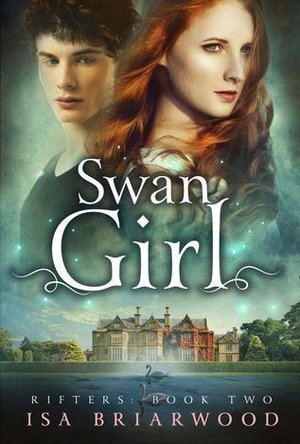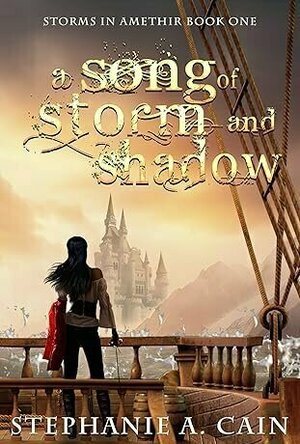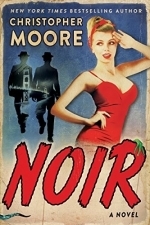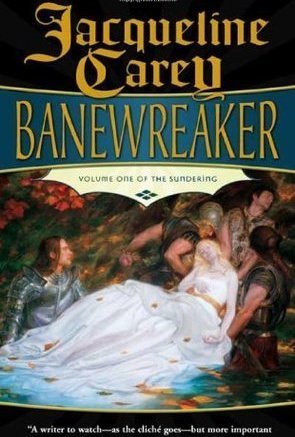
Danse Macabre
Book
It was not long after Halloween when Stephen King received a telephone call from his editor. 'Why...

World After
Book
The irresistibly compelling BOOK TWO in the long awaited PENRYN AND THE END OF DAYS series. It is...

Swan Girl (Rifters #2)
Book
Cate and Angus barely managed to escape from The Village, a way station for accidental time...
Urban Fantasy Time Travel

A Song of Storm & Shadow (Storms in Amethir #1)
Book
Princess Azmei of Tamnen doesn’t like the decision she’s facing: marry Vistaren of Amethir or...
Epic Fantasy

Noir: A Novel
Book
The absurdly outrageous, sarcastically satiric, and always entertaining New York Times bestselling...
humor fantasy fiction
Mandy and G.D. Burkhead (26 KP) rated Banewreaker in Books
May 20, 2018
Banewreaker, the first book in Jacqueline Carey’s two-part volume The Sundering, will probably not change any opinions in this respect, then, as it’s sweeping high fantasy to the core. This, as it turns out, is both its greatest strength and its greatest weakness.
There are some reviews out there that laud Banewreaker as a masterful examination of subjective viewpoints in an epic fantasy turned into a human tragedy by a simple change of perspective. And they are absolutely correct.
There are other reviews, however, that call the book out as a heap of all of the stalest fantasy clichés piled one atop the other in a confusing and pretentious jumble with a shellacking of purple prose for good measure. And they are also absolutely correct.
Let me explain.
For starters, it would be inaccurate to say that this story is full of clichés. This story is clichés. This story is every familiar and used-up trope you would expect from a high fantasy, all of those details that have been done to death in thousands of other versions until almost nothing that happens seems original anymore.
This is what’s going to turn off a lot of people. But the thing is, Banewreaker has to be this way. It wants the reader to look at all of the things that they’ve come to expect from a fantasy epic and then, by shifting the narrative focus, realize that all of these beloved tropes are actually, when you think about it, tragic as hell.
In other words, it’s Lord of the Rings from Sauron’s point of view.
It’s not a riff, though. It’s not goofy like most of the stuff I go in for. It takes its subject just as seriously as the stories that it’s mirroring, and this is what makes the whole story ultimately so gripping and so moving.
The story starts out like many stories of this magnitude, with exposition stretching back to the Dawn of This Particular Creation. In this case, we have a protogenos world god named Uru-Alat who died and gave rise to seven smaller godlike beings called Shapers. First comes Haomane, who becomes the Lord of Thought and sets himself up as head honcho for this ensuing pantheon. Second is Arahila, the Basically a Love Goddess; and third is Satoris, whose purview was “the quickening of the flesh,” which is high fantasy speak for sexy times. Four more Shapers come after this who, for the sake of brevity, we’ll be glossing over.
To summarize the important godly exposition, the Seven Shapers set about shaping the world to the surprise of no one. Haomane creates elves (here called Ellyl, but if you’ve ever even looked at a fantasy, you know that they’re the elves here), Arahila creates humans, and Satoris doesn’t create anything because he’s busy hanging out with dragons and learning their wisdom. Satoris grants his fleshy quickening to the humans but not the elves, because Haomane didn’t want his elves to do that. Then Haomane decides he doesn’t want the humans to do that either, but Satoris refuses to take the gift away again. Conflict escalates, god wars ensue, and the world splits into two continents, with Satoris ostracized from his brethren on one and the remaining Shapers on the other. By the time the dust has settled, Satoris is scarred and burned pitch black, living in a mostly dead land thanks to Haomane’s wrath, but with a dagger in his possession that is the only weapon capable of killing any of the Shapers.
The story itself picks up thousands of years later, with Satoris as the Satan/Sauron stand-in living in a forbidding land surrounded by classically evil things like trolls, giant spiders, and insane people. Since Haomane is the head god, the rest of the world believes Satoris to be a terrible figure of evil and betrayal, while Satoris’s few allies know him as a pitiable and misunderstood figure who only ever wanted to honor his word and do right by his own sense of morality rather than the dictates of his elder brother god king.
From here the plot becomes the typical Army of Good vs. Army of Evil adventure, but with the protagonistic focus on Satoris and his allies. His trolls we see not as a mindless horde but as a simple, honorable people who happily serve their lord because he happily serves them right back. The mad individuals inhabiting his fortress are castaways from normal society with nowhere else to go. And the giant spiders just happen to live there and be bigger than normal, with no sinister intentions beyond that.
And just like that, by actually showing us the home life of the ultimate in evil fantasy tropes, we see how easily one side’s view of evil is another’s view of good. In doing so, Banewreaker becomes perhaps the first sweeping fantasy epic with no real bad guy, just two sides of an unfortunate conflict. Both sides have their likeable characters, both sides seem from their view to be in the right, and pretty soon you, as the reader, will stop cheering for either one, because whenever one person that you like succeeds it means that another person whom you also like is failing.
In fact, the closest thing that this story has to a clearly-labeled “evil” character is the sorceress Lilias, and even then, she’s not evil so much as a woman who has done some bad things for completely understandable reasons. Lilias, in fact, is one of the most pitiful characters in this whole saga of pitiable characters, with her fears and attachments closely mirroring those of most readers, only amplified by her immortality and magical powers. She is afraid of dying. She wants to be more in the grand scheme of things than just another man’s wife or another country’s momentary ruler, both of which would just be tiny moments in a long history. She likes her youth. She likes having pretty things and pretty people around her. And from her interactions with her dragon mentor and apparently only friend, Calandor, we see that she is also capable of intense affection and even love just as she is capable of indulging in self-centered self-interest that, if not particularly a good trait, is also one that she is not alone in possessing.
Banewreaker, then, is a story with a large cast of characters but very few actual heroes or innocents as well as very few outright villains, which is exactly what it sets out to be. Those who love it and those who hate it both seem to blame this quality in particular for their feelings. The biggest complaint leveled against it (that I have read, anyway) is that the people we should be rooting for do not deserve our sympathy, while the people we should be rooting against are more misguided and unwilling to see things in another light than deserving of our scorn.
This is true. But if it’s a flaw, it’s an intentional one. And if it makes you feel like you shouldn’t be cheering for either side at all in this conflict, that’s the point. This is a story of clichés, yes, but it has something that it needs to say about these clichés and, in doing so, about the subjective and impossibly nebulous quality of morality in general.
In short, here again is another fantasy story about the Forces of Good wiping out an entire nation dedicated to their “evil” enemy. And as the story points out, even if you believe in that cause, you’re still wiping out an entire nation of people. No way is there not a downside to that. Seeing things in a black-and-white morality just means crushing a whole lot of important shades of gray underfoot.
Whether or not you like Banewreaker, then, depends in large part upon how much you realize that Carey as an author is being self-aware. As someone who read and still hasn’t stopped being awed over her Kushiel series, I can’t claim complete objectivity in this area, because I came to Banewreaker already in love with her. I can say, however, that unless you have an intense and searing aversion to ornate and sweeping style, this book is worth any fantasy-lover’s time – especially if you’ve ever felt a pang of empathy for all of the poor villainous mooks that fantasy heroes tend to mow down without a thought because they were the wrong kind of ugly.

Lists for Writers - ideas for creative writing
Education and Reference
App
Lists for Writers is a great addition to any writer’s toolbox. Helpful to both novice and expert...
Merissa (13749 KP) rated Lacuna in Books
Oct 23, 2020
Their world is split into four, with one ruler for each quarter. To ensure no fighting, there is a central command (if you like) but obviously, not everything can be good in paradise. I loved how each quarter was so different and how the people embodied their element. Crow and Tancho, without doubt, are my favourites and that is completely as it should be.
When they find out what their birthmark bond is actually about, I thought it fantastic. They wanted to kill each other most of the time and their verbal battles, childishness and general poutiness were spot on. After all, how would you feel being tied to someone you didn't know, even if you did find them attractive?
The world-building is perfect and the pacing is second-to-none. There is plenty of action going on in Crow and Tancho's world and therefore, it makes sense, that they would have no time to explore their growing bond. When they do, however, they make up for lost time. 😉 There is also a brilliant cast of supporting characters, from best friends to the other king and queen. They all have their own foibles and interests but pull together perfectly.
I adore MM and Fantasy so, for me, this was the perfect blend of both. An amazing story set in a fantastic world with an outstanding storyline and wonderful characters. What more could you ask for? Absolutely recommended by me.
* A copy of this book was provided to me with no requirements for a review. I voluntarily read this book, and the comments here are my honest opinion. *
Merissa
Archaeolibrarian - I Dig Good Books!
Hazel (1853 KP) rated Immortal Writers in Books
Dec 17, 2018
Words are the most powerful form of magic. Jill Bowers creates a unique fantasy concept in this soon to be published adventure novel. When <i>Immortal Writers</i> begins, the genre is similar to many contemporary novels: characters living normal day-to-day lives. Eighteen-year-old Liz has just landed back in her hometown after touring to promote her new novel, the next in a popular fantasy series that won her the Best Young Fantasy Award. All she wants is to return to her apartment and go to bed, so being kidnapped was not part of her plan. Especially not being kidnapped by the formidable William Shakespeare.
What Liz and readers both learn next is a brilliant, awe-inspiring idea. Imagine that all the world’s most famous authors were immortal and lived together in a magical castle manipulated by the science fiction novelists. That is what Liz suddenly has to come to terms with. Although she is only young, her books show so much potential that she is already initiated into the Immortal Writers. But it is not only legendary writers inhabiting this fortress. When an author becomes immortal, their characters become real. Liz is shocked to come face to face with the handsome hero of her story as well as a few of her supporting characters. However that is not all that has crossed over into reality.
As well as the goodies, the evil characters have also been brought into the world. Kenric, Liz’s antagonist, has hidden himself nearby with hundreds of dragons. He wants dominion over the entire planet and the only person that can stop him is Liz herself. So begins an adventure of learning to use magic, sword fights, dragon attacks and inevitable, heart wrenching causalities.
As a writer, Jill Bowers has not quite got the level of standard that the top authors have achieved. This is evident from the lack of description and awkwardness of the prose throughout the first few chapters. Once the storyline is well under way it becomes a lot easier to read; whether her writing improves is debatable, but her imagination captures the readers attention and provides a thoroughly entertaining narrative.
It is not solely the plot, characters and action that will stay in readers’ minds – the overall concept is fantastic. Who would not want their favourite authors to live forever? I would love to meet a William Shakespeare who has adapted himself to modern day living. Even more exciting is the possibility of meeting fictional characters. Each reader is bound to start daydreaming about which of their most loved books they would like to become real. How great would it be to meet Harry Potter, or see a unicorn, or eat some chocolate made by Willy Wonka, or… the possibilities are endless.
<i>Immortal Writers</i> is the first novel in a series so there will be more books that focus on this amazing idea. From the preview at the end of this copy, it appears that the following book will be about different authors/characters, therefore will provide a whole new outline to wrap our heads around.
Fantasy fans should definitely seek out this series. The writing may not exactly be up to par, but the general storyline is unquestionably worth it. Encompassing, contemporary, adventure and romance genres, <i>Immortal Writers</i> is an incredible fantasy story based in the “real” world.
Hazel (1853 KP) rated The Paper Magician (The Paper Magician Trilogy, #1) in Books
Dec 7, 2018
<i>The Paper Magician</i> is the first in a trilogy of fantasy books by Charlie N. Holmberg. Set in London in the early 1900s it explores the idea of magic in a unique and original way. The protagonist, Ceony Twill, is only nineteen and has recently graduated from the Tagis Praff School for the Magically Inclined. For the next few years of her life she is to be apprenticed to a magician who will teach her to use the magic of their chosen material. To Ceony’s disgust she is paired with Magician Emery Thane, a Folder. She is going to spend the rest her life bonded to an extremely boring object: paper.
Ceony and the reader soon discover that there is a particular art to folding paper correctly in order to produce something (e.g. a paper bird) that lives and breathes. But there is something peculiar about Mg. Thane and he ends up in a life and death situation that only Ceony can save him from.
The originality of the plot made this book fascinating to read. A large variety of magical abilities have been explored throughout novels over the years but until now I have not read one that focuses on the material paper. The author has taken something that exists in the known world – origami – and given it a whole new purpose.
Both Ceony and Mg. Thane are likable characters that have a variety of character traits that appeal to a range of different personalities. There were times when their behaviour and speech felt too contemporary for the historical setting resulting in the time period being completely irrelevant to the narrative. Despite this the general storyline was still exciting.
Fantasy novels naturally involve ideas a little beyond the average person’s comprehension, however the middle of <i>The Paper Magician</i> became so far fetched that it was a little confusing for a while.
Overall, <i>The Paper Magician</i> is a fast paced, easy to read book suitable for young adults and fans of fantasy and magic. The story continues in <i>The Glass Magician</i> and the third and finally book can be expected in 2015.


